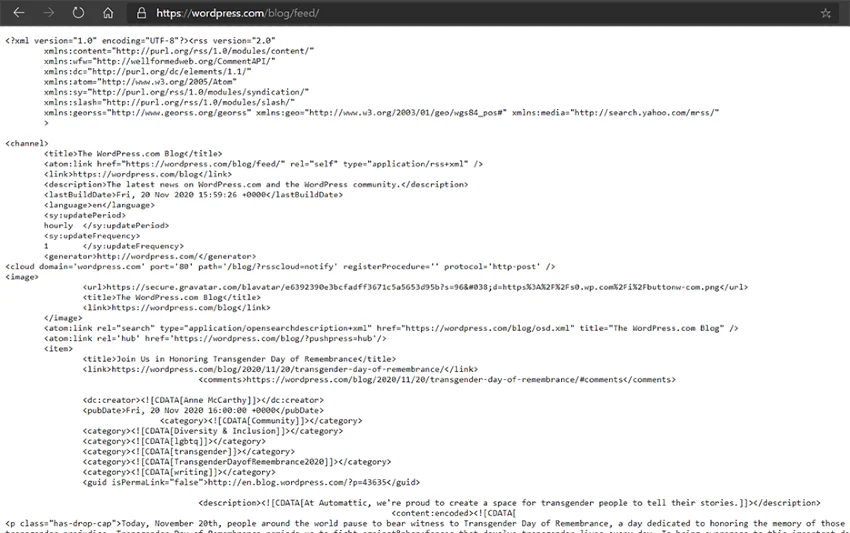Updated: March 2021
3 Useful WordPress Plugins for Those Still Utilizing RSS Feeds
Believe it or not, but RSS feeds are still a thing, and they still receive support from third party developers even though Google officially killed off their RSS service, FeedBurner, in 2012. RSS feeds provide an opportunity for readers to continually receive your content in a customized manner that also includes content from other subscriptions. It is like Google News combined with being a YouTube Subscriber but with fewer ads (which is probably why Google killed it). Widgets and RSS icons were all the rage in the early 2000s in an effort for bloggers and businesses to not only engage with their audience, but to monitor engagement with their articles.
RSS feeds are still handy because they allow people to get your content without having to continually visit your website for it, which is something they may forget to do. RSS Feeds are updated when content is published (or on a set schedule), and you do not have to do anything more than that for your content to be delivered to those that subscribe to your feed. Depending on the type of feed reader that they are using, they’ll even be notified by email or notification that you’ve posted something. Speaking from my own experience as a blogger, this translated into my content being read a lot more than without utilizing RSS feeds.
Four benefits to using RSS:
- RSS is published only in XML format, which means it is easily machine-readable as well as easy on your eyes, but it helps Google crawl your website a bit more and that can bump up your search ranking.
- If your RSS only contains a portion of your article, it can drive a lot of traffic to your website if your subs see something they like. You can tailor how long the article preview is.
- You can tie your RSS feed to an automated email campaign so that when you post, an email is automatically sent.
- Not only that, but you can import other feeds into your own from multiple sources and have it appear on your website, thus driving up your traffic while keeping your audience hooked.
Feedzy is one of, if not the, most powerful RSS plugins on the market today, and it has a free version. It allows you to aggregate an unlimited number of RSS feeds and automatically publish them to your website. This frees up a lot of your time because it will be auto-blogging for you from any number of sources you like, and in turn your SEO and audience engagement will increase.
Some key features:
- Bulk import and organization of multiple feeds from like topics into just one category.
- Import images into your feed, or use your own logo or image for feeds that do not have an image.
- Complete control of the number of items you wish to show from a feed source.
- Responsive content across all platforms.
- Convert feed items easily into posts/pages/categories.
This one is like Feedzy above as you can import any number of feeds onto your own website (with consent of course). With this plugin you can add feeds anywhere with PHP, widget or their shortcode. Using short bits of code that they provide, you can easily customize the feeds and how they display on your website or page. The sheer number of parameters that are customizable make this a worthwhile option for those that want a bit more flexibility.
Example Shortcode: [RSSImport display=”5″ feedurl=”https://bueltge.de/feed/” use_simplepie=”true”]
Example parameters:
display – The number of items to display. Default is 5. feedurl – The feed address. Default is https://bueltge.de/feed/. before_desc – The HTML or string to insert before the description. Default is empty. You can use some variables which will be replaced, see below.
The plugin has been translated into multiple languages.
Category-Specific is different in that it allows subscribers to get extremely specific with what feeds they would like to subscribe to by providing a menu of multiple RSS feeds in addition to your own feed. This allows you to organize a wide variety of posts into any number of categories such as WordPress, Apple and Google so that scrolling through everything to find one particular article isn’t necessary. If you’re utilizing tags on your blog (and you should be for search engines) then you can create RSS categories using your own tags so that way it automatically pulls in all posts in that particular tag.
Category-Specific has three main options for using their widget and two additional methods for posts/pages.
- Add the Category Specific RSS Widget to your sidebar from the Widget menu.
- Add the shortcode [category_specific_rss_menu] to your posts or pages.
- Call the function from template files,
- Use the [tag_specific_rss_menu] shortcode to your posts, pages, sidebar widget to add a tag specific rss feed menu.
- Use the [tag_specific_rss_cloud] shortcode to your posts, pages, sidebar widget to add a tag cloud with rss feed of each tag.
WordPress does have its own RSS feed built right in
Handily, WordPress automatically generates a feed for you, and you can access it by adding /feed onto your address. WordPress doesn’t offer any customization beyond creating additional feeds utilizing different URLs such as /rss2, which is why the above plugins become necessary if you wish to do anything beyond displaying your own comments, posts and categories. Unless you have disabled it when setting up your website you can always access it via that address, and it should look similar to the photo below of the official WordPress blogs RSS feed.

4 Additional Things You Can Do With RSS
- The National Weather Service publishes severe weather alerts, enabling you to get notified of severe weather without the need for an app. Your local weather station might offer this as well.
- Chicago is a major city that utilizes RSS for public transportation. You can receive rail, bus and other transit alerts that are relevant to your needs. Your own city may offer something similar.
- Keeping an eye on the Top 10 Nasdaq stocks but don’t want to have the TV on all day? They provide RSS feeds not only for their articles but all the top 10 stocks.
- You can set up Google Alerts for any mention of you, your company or your rival, and they’ll all be delivered to you via RSS.
My Final Thoughts on WordPress RSS Plugins
The default WordPress RSS will satisfy a majority of people because it offers the easiest way to gain subscribers based purely on your own content and can benefit you in search rankings. For those that wish for more control over their feeds and to import a variety of feeds from sources that you enjoy, you’ll need to step it up to one of the plugins above. The ability to add in continually updating content to your posts/pages can be extremely beneficial to a lot of users and since it is easily done with a widget, shortcode or both it doesn’t have much of a downside. You will want to put it on a schedule so that it isn’t always searching for updated content as that can negatively impact your site speed and therefore your Google ranking.
In short; RSS feeds are still handy in 2021.
Related Links



Content marketing is the backbone of the biggest success stories over the last decade. I’m referring to companies like Zomato, Canva, ThinkGeek, HootSuite and even Blendtec. It’s not surprising that so many brands are focusing on content marketing, given the average ROI is twice any other type of digital marketing. Keep Learning >

Everyone who is selling something could use a strong info-product to compliment their brand and boost engagement. Whether you charge for it upfront or not is irrelevant. I’ve put together my 18 step cheat sheet for creating awesome products. Keep Learning >



